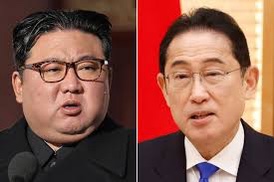North Korea reveals Japanese PM’s request for summit with Kim Jong Un

North Korean leader Kim Jong Un’s influential sister, Kim Yo Jong, disclosed on Monday that Japanese Prime Minister Fumio Kishida had expressed interest in a summit with her brother. However, she emphasized that such a meeting was contingent upon a shift in policy by Tokyo.
The historical animosity between the two nations, stemming from issues such as a prolonged kidnapping dispute and North Korea’s prohibited weapons programs, has complicated prospects for bilateral dialogue. Despite this, Kishida has recently signaled a willingness to improve relations, a stance cautiously received by Pyongyang..

Kishida’s overture includes an expressed readiness to meet Kim Jong Un “without any conditions,” underscoring Tokyo’s commitment to resolving longstanding issues, notably the abduction of Japanese citizens by North Korean agents during the 1970s and 1980s. Kim Yo Jong, serving as a key spokesperson for the regime, relayed Kishida’s intention to engage in direct dialogue through an official statement carried by the Korean Central News Agency, hinting at the possibility of a future invitation for the Japanese leader to visit North Korea.
However, Kim Yo Jong cautioned that without substantial policy adjustments from Tokyo, the prospects for enhancing bilateral relations remained bleak. She underscored the importance of addressing the abduction issue, a deeply emotive subject in Japan, warning that failure to do so would impede Kishida’s aspirations for improved ties. In response, Kishida reiterated the significance of top-level talks in resolving key issues, particularly the abduction problem, while acknowledging the ongoing diplomatic efforts at his administration’s level.
The abduction issue remains a poignant concern for Japan, with suspicions lingering over the true extent of the abductions beyond officially recognized cases. Sakie Yokota, whose daughter Megumi is among the missing abductees, expressed hope for dialogue between the two nations, stressing the urgency of the matter. However, skepticism persists among experts regarding North Korea’s sincerity in addressing the abduction issue, posing a challenge for Kishida in garnering public support for diplomatic engagement with Pyongyang.
The historical context of Japan-North Korea relations includes past attempts at reconciliation, notably former Prime Minister Junichiro Koizumi’s landmark visit to Pyongyang in 2002. Despite initial progress, diplomatic efforts faltered over concerns regarding the abduction victims, highlighting the complexities inherent in bilateral dialogue. Analysts view North Korea’s recent statement as a strategic move to gauge Japan’s commitment to a potential summit and establish its own prerequisites for such a meeting, underscoring the delicate nature of diplomatic negotiations in the region.














